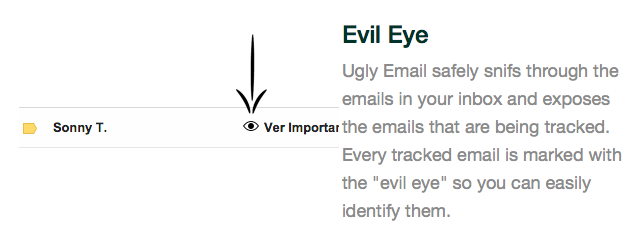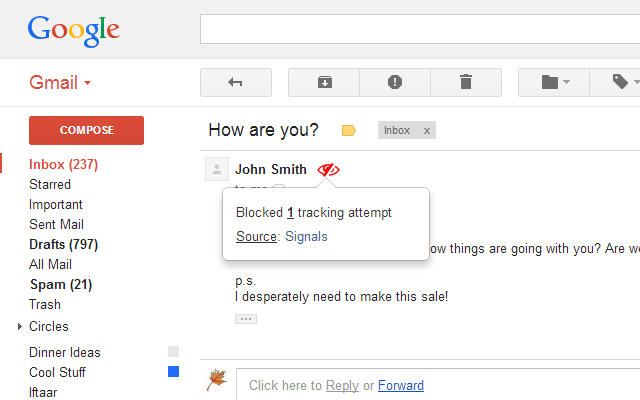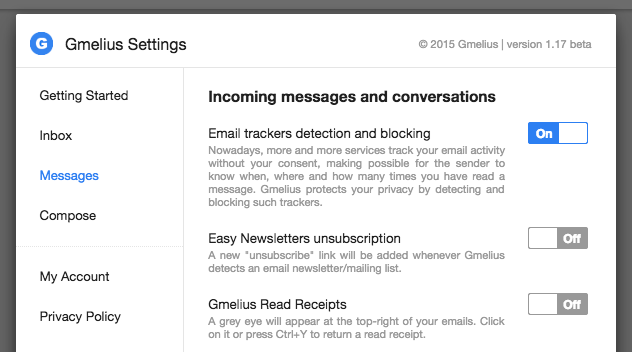People are tracking which websites you visit, whether you open their email and more – but you can stop them. Here's how.
Cool Websites and Tools digs up things not yet covered on MakeUseOf, all focused on a particular theme. Today that theme is blocking tracking tools, something we've covered a few times but for which more tools seem to pop up constantly. Let's get started.
Ugly Email (Chrome, Firefox Coming Soon): Spot Email Trackers in Gmail
A variety of services give people and companies who email you a chance to track whether you've opened an email, and where you were when you opened it. How? By embedding a tiny, one-pixel image in the message, and then tracking when the image is loaded and by whom.
If you'd rather not be tracked, Ugly Email can let you know when trackers are being used in Gmail. You can then avoid opening such emails if you're concerned – or just mentally note that a particular company or person is tracking you.
Currently Ugly Email can track emails from the following services:
- Streak
- Yesware
- Mandrill
- MailChimp
- Postmark
- Bananatag
Support for other services is apparently coming, as is a version of the extension for Firefox users.
PixelBlock (Chrome): Block Email Trackers in Gmail
PixelBlock goes a step further than Ugly Email, by not only letting you know about email trackers but also blocking them. This means that, even if you open an email with an email tracker embedded, the tracker won't work.
Some email marketers will follow up aggressively if they see you've opened the email; this tool makes that less likely.
Privacy Badger (Firefox and Chrome): Privacy Tool From the Electronic Frontier Foundation
Of course, email isn't the only place you're being tracked: as you browse the web, a variety of services – social networks, ad networks, and more – are monitoring your activity for a variety of reasons. You've probably heard of using services like AdBlock Plus or Disconnect to prevent tracking, but the Electronic Frontier Foundation found these and other solutions lacking. Their solution was to make their own browser extensions for privacy, called Privacy Badger.
This browser plugin blocks any and all third party sites that try to track you as you browse the web. This means it will block most (but not all) online ads, as well as social networking buttons.
Google Analytics Opt-Out (All Major Browsers)
A lot of websites, ours included, use a service called Google Analytics to find out how many people look at their site, which articles are the most popular and where these people live. Such information isn't specific to any one person: it's just a general overview of visitors.
Still, some people might be uncomfortable with such tracking, or with how much Google knows about them, which is why this browser extension is offered. It's available for Internet Explorer, Chrome, Firefox, Safari and Opera.
Gmeluis for Inbox (Chrome): Customize Google's Inbox [No Longer Available]
We've shown you how Gmelius can customize Gmail, but if you've moved on to Inbox you'll notice it doesn't work anymore – until now. A new extension from Gmelius is specifically built for Inbox. You'll get all kinds of customization options.
It's also, so far as we know, the first tool out there that can block email trackers for Google Inbox users.
"Hey, What About Firefox Users?"
Cool Websites and Apps is a column that tries to focus on new things – meaning everything we cover hasn't been featured on the site yet. Sometimes this means some platforms are favoured over others, and today that means Chrome. Firefox users might feel left out, but they can check out Disconnect, which blocks a variety of trackers or the the top privacy extensions for Firefox we outlined a while back.
While we're at it, why not list even more privacy tools in the comments below. Let me know your favourites, okay? I can't wait until you all say "AdBlock".
Image Credits: sitting in dark room Via Shutterstock





